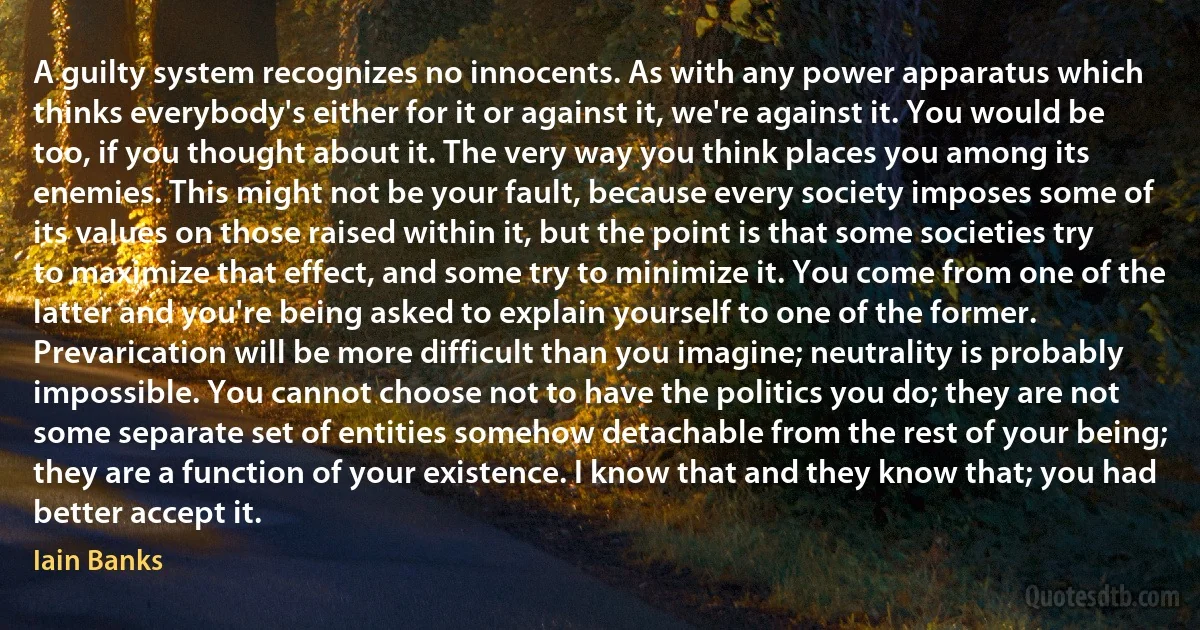
A guilty system recognizes no innocents. As with any power apparatus which thinks everybody's either for it or against it, we're against it. You would be too, if you thought about it. The very way you think places you among its enemies. This might not be your fault, because every society imposes some of its values on those raised within it, but the point is that some societies try to maximize that effect, and some try to minimize it. You come from one of the latter and you're being asked to explain yourself to one of the former. Prevarication will be more difficult than you imagine; neutrality is probably impossible. You cannot choose not to have the politics you do; they are not some separate set of entities somehow detachable from the rest of your being; they are a function of your existence. I know that and they know that; you had better accept it.
Iain BanksRelated topics
apparatus choose fault guilty impossible might neutrality point politics power rest set thought think try wayRelated quotes
The prejudices of the second species, since they impose upon the intellect by the sensual conditions restricting the mind if it wishes in certain cases to attain to what is intellectual, lurk more deeply. One of them is that which affects knowledge of quantity, the other that affecting knowledge of qualities generally. The former is: every actual multiplicity can be given numerically, and hence, every infinite quantity; the latter, whatever is impossible contradicts itself. In either of them the concept of time, it is true, does not enter into the very notion of the predicate, nor is it attributed as a qualification to the subject. But yet it serves as a means for forming an idea of the predicate, and thus, being a condition, affects the intellectual concept of the subject to the extent that the latter is only attained by its aid.

Immanuel Kant
For what advantage is it, that the world enjoys profound peace, if thou art at war with thyself? This then is the peace we should keep. If we have it, nothing from without will be able to harm us. And to this end the public peace contributes no little: whence it is said, ‘That we may lead a quiet and peaceable life.' But if any one is disturbed when there is quiet, he is a miserable creature. Seest thou that He speaks of this peace which I call the third (inner, ed.) kind? Therefore when he has said, ‘that we may lead a quiet and peaceable life,' he does not stop there, but adds ‘in all godliness and honesty.' But we cannot live in godliness and honesty, unless that peace be established. For when curious reasonings disturb our faith, what peace is there? or when spirits of uncleanness, what peace is there?

John Chrysostom
On the one hand, the student has been informed by some writers that the only certain way lies in the use of the entropy-function and the thermodynamic potentials; on the other hand, he is told with equal authority that the method used by the original investigators has been the consideration of cyclic processes, and that the former method is nothing but a mathematical (perhaps unnecessary) refinement of the results obtained by the latter. These extreme attitudes appear to me to be unfortunate, and more especially when one observes the physical clearness introduced by the use of cyclic processes, but at the same time remembers that most of the results obtained by separate investigators using cyclic processes had, with a great many more, previously been found by J. Willard Gibbs by means of a purely analytical method.

J. R. Partington
The noble lord who moved the address had, in the course of his speech, warned the House not to let an anxiety for liberty lead to a compromise of the safety of the state. He, for his part, could not separate those things. The safety of the state could only be found in the protection of the liberties of the people. Whatever was destructive of the latter also destroyed the former...The discontent existing in the country had been insisted on as a ground for the adoption of some measures...But there was another axiom no less true-that there never was an extensive discontent without great misgovernment...When no attention was paid to the calls of the people for relief, when their petitions were rejected and their sufferings aggravated, was it wonderful that at last public discontents should assume a formidable aspect?

Charles Grey, 2nd Earl Grey
This one is too elegant, too shiny, like jewelry. It seeks applause. This is clear to me, but difficult to explain, which is what makes abstraction so fascinating. In one sense, abstract art is absolutely nothing, stupid. In 100 years, maybe people will just think it's garbage. But somehow we see something in it; we have a sense of quality. [searching for an illustration of his point, Richter leafs through a catalog to find some of his 'gray monochromes']. I was doing these [monochromes] when I was getting divorced. When you feel totally empty, you do this - but then I saw that one picture was actually better than another. Both were miserable, but the difference was interesting. I loved this: that there must be something, some higher faculty, some progressive sensibility that we find in abstraction. But it is impossible to describe.

Gerhard Richter
